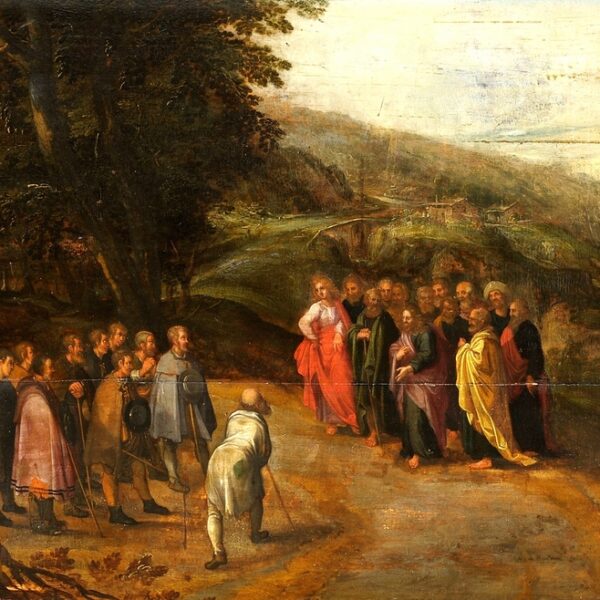Who were the Pharisees really?

Pastor Todd Smith and the North Georgia Revival Challenge
January 30, 2023
Was legalism really the sin of the Pharisees?
June 11, 2023Have you ever heard a Christian dub another believer or group of believers “Pharisees,” perhaps because such a one held a viewpoint different from his own? The label is used to imply negative traits, and presumably the moral and spiritual superiority of the one applying it. But held up against scripture, is it accurate?
Taking a close look at the scriptures, here are 23 defining characteristics of the Pharisees (note that this list is not exhaustive; further note that there are Pharisees such as Nicodemus and Gamaliel that break away from their peer group and invoke thoughtfulness and reason; therefore, the term “Pharisee” is in some ways a generalization but we will use it here in its broader sense):
- Unjust. Jesus adjured the Pharisees to “Stop judging by outward appearances, and start judging justly” (John 7:24, Berean Standard)
- Jealous. Threatened in the face of righteous authority, the miracle of the man born blind receiving his sight not only left them wholly unmoved, the man’s challenge to them in John 9:30 about the nature of Jesus caused them to turn on him in fury and cast him out of the synagogue. Likewise, the popularity of the apostles’ preaching later of the resurrection of Jesus filled the Jewish priests with jealousy (Acts 5:17), and while this is in reference to the Sadducees, the council here also was comprised of the Pharisees, as it is noted that Gamaliel was a Pharisee (Acts 5:34)
- Deceitful; double minded and duplicitous. When Jesus went to Jerusalem, people knew the Pharisees were looking to kill him, but pointed out that the Pharisees were too scared even to call him out in public (John 7:25-26). Jesus called them out for failing to practice what they preached (Matthew 23:3-4) and for appearing righteous while inside being full of hypocrisy and wickedness (Matthew 23:28). He also stated that their nature, like that of their father the devil, was to lie (John 8:44b)
- Motivated by money. The love of money by the Pharisees is stated outright in Luke 16:14.
- Majored in the minors. Jesus continually called out the Pharisees for getting hung up on the smallest matters while utterly neglecting that which is most important to the heart of God (Matthew 23:23-24; ).
- Accusation and framing were their choice weapons. “And the scribes and the Pharisees watched him, to see whether he would heal on the Sabbath, so that they might find a reason to accuse him” (Luke 6:7). “So they watched him and sent spies, who pretended to be sincere, that they might catch him in something he said, so as to deliver him up to the authority and jurisdiction of the governor (Luke 20:20). Later, “the chief priests, and elders, and all the council, sought false witness against Jesus, to put him to death” (Matthew 36:59, 60, emphasis added).
- Gloried in the approval of men and not God. Called out by Jesus, their desire for popularity opposed any righteous fear of the Lord. (John 5:44, John 7:18, John 12:43).
- Made political alliances with enemies to advance their agenda. The Pharisees detested the Sadducees, but ganged up on Him whom they hated more. Pulpit commentary notes, “The two sects were directly opposed to each other…But both were hostile to Christ, whose teaching, on the one hand interfered with rabbinism, and on the other maintained the existence of the supernatural and the certainty of the resurrection. The Sadducees alone seem to have attacked Christ only on two occasions. They were probably Herodians (comp. Matthew 22:16), and on this account also disliked by the Pharisees; but they were powerful, and held most of the highest offices in the state, and their alliance was sought or allowed in order more effectually to compromise Jesus. Even theological hatred and political opposition sank into indifference in the face of what was regarded as a common danger.” We also see the leaders stating the unimaginable in their frenzy to see Jesus crucified, “We have no king but Caesar!” (John 19:15).
- Used ad hominem attacks. An ad hominem attack is defined as “an argument or reaction directed against a person rather than the position they maintain; appealing to feelings or prejudice rather than intellect” (Merriam-Webster, Cambridge Online Dictionary). When Nicodemus reminds his fellow Pharisees that their law does not convict a man before hearing all the facts, they evade the question and turn to attack him personally, saying “Are you from Galilee, too? ” (John 7:50-51).
- Scoffers. In Luke 16:14 the Pharisees scoffed at Jesus’ warning of the love of money because they themselves loved money. Later, as Jesus endured the torment and humiliation of the cross, they stood sneering at Him (Luke 23:35).
- Immature. Jesus likened them to pouting children (Matthew 11:16-17; see also Isaiah 3:12).
- Oppressive. “Blind guides” who put heavy burdens on others is used by Jesus to described them in Matthew 23:16. They demanded not only the practice of the law of Moses (which they themselves didn’t adhere to), but added to them with superfluous ancestral traditions (Mark 7:5)
- Arrogant. Jesus called them out for taking the best seats in the synagogues and exalting themselves (Luke 11:43), all the while being tricked out, strutting in public in their long robes (Mark 12:38).
- Proud. At the home of Simon the Pharisee, Jesus illustrated how a sinful woman had the joy of having her sins forgiven as she saw herself for what she was, while he, Simon, loved little because he thought he was a rather righteous fellow (Luke 7:47).
- Stubborn. Stephen when full of the Holy Spirit called them “stiff-necked” in Acts 7:51, “uncircumcised in heart and ear.”
- Conniving. Obsessive in their quest to eradicate Jesus, they could think of nothing else but trapping Him in His own words and getting Him out of the way (Mark 3:2, John 8:6, et al.)
- Easily offended. Taking offense at both righteous deeds done by Jesus (Matthew 13:57) and also the truth of His words (Luke 11:45), they cared more about their wounded pride.
- Resistant to the Holy Spirit. Stephen likewise called them out for “always resisting the Holy Spirit, as did [their] fathers” (Acts 7:51). Indeed, they plugged their ears toward the end of his exhortation to them connecting the dots of God’s divine plan to the Jewish people to send Jesus (Acts 7:57)
- Hearts distant from God. (Mark 7:6)
- Poisoned with bitterness. Jesus called them “a brood of vipers” to their faces (Matthew 12:34), noting that nothing good could come out of the mouths of ones whose hearts were so full of evil. It is interesting that vipers, or adders, are poisonous, and also that they are among the only snakes that give birth to live young, as opposed to laying eggs. This bring to mind Psalm 7:14, “Behold, the wicked man conceives evil and is pregnant with mischief and gives birth to lies.“
- Lawless. Jesus described them to their faces: “So you also outwardly appear righteous to others, but within you are full of hypocrisy and lawlessness” (Matthew 23:28). Stephen the first martyr called them out for receiving the law ordained by angels but failing to keep it (Acts 7:53).
- Murderous. The Pharisees sought not only to kill Jesus for threatening their power structure, but they also wanted to kill Lazarus, whom Jesus had raised from the dead (John 12:10-11). Before Saul the Pharisee became Paul the Apostle, he heartily approved of the stoning of Stephen (Acts 8:1).
- Sons of hell. In John 8:44, Jesus confronts the Pharisees outright on their evil nature, of which He says “ You are of your father the devil, and you want to do the desires of your father.” Two hallmarks of their being offspring of Satan Jesus states as deceit and murder.
So we see that it is a serious charge to accuse someone of being a Pharisee. It may be in fact a Pharisaical ad hominem attack rather than a just assertion. For really, we are accusing such a one of being anti-Christ, murderous, and not knowing the Father, among other charges.
In light of this list, who today really resembles the Pharisees?
Most importantly, we must hold up this mirror and ask, is there even one of these traits that defined those who hated Christ of which we ourselves are guilty?





